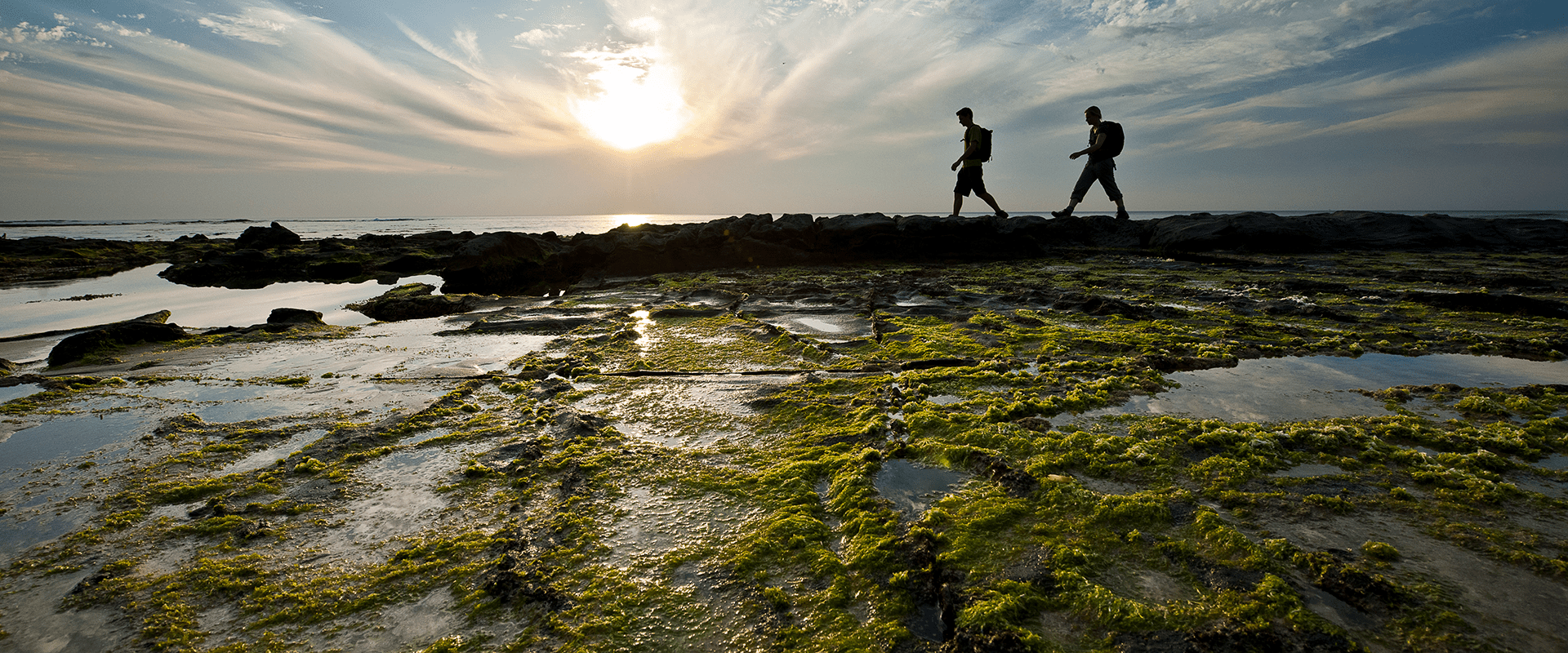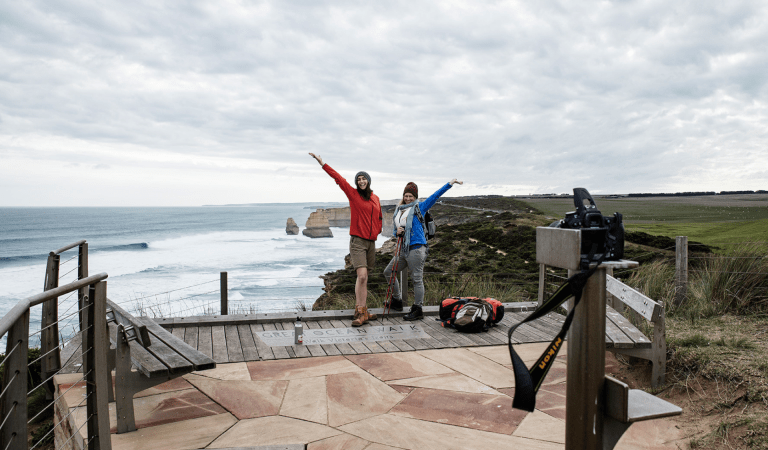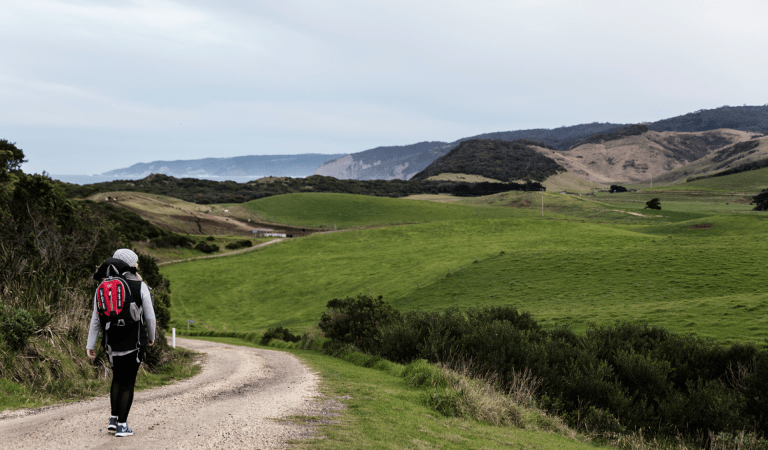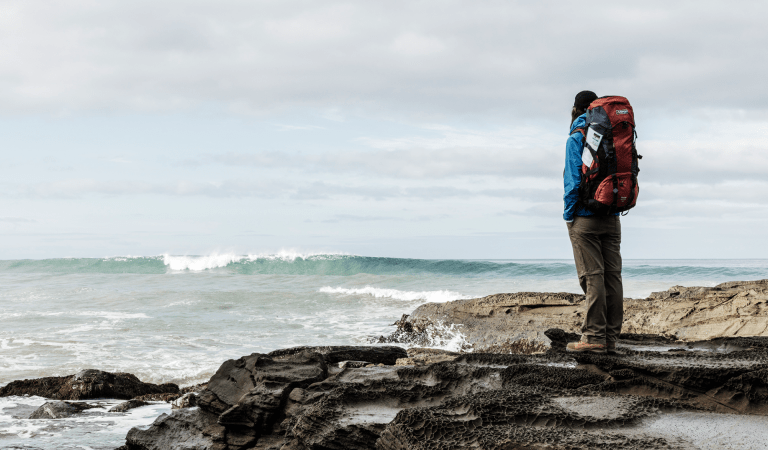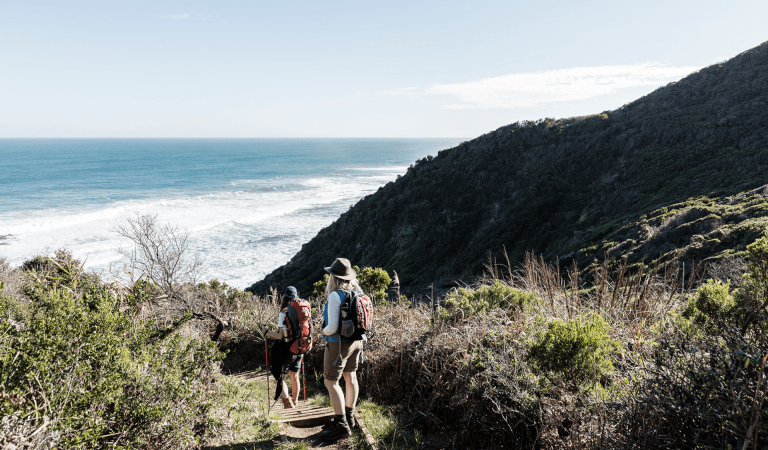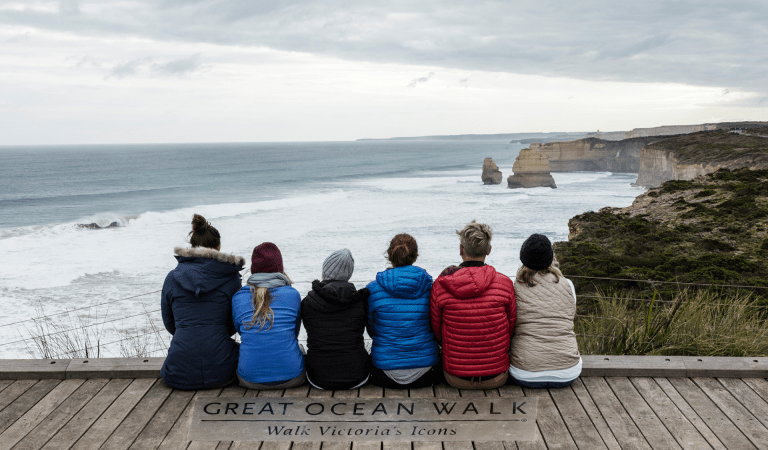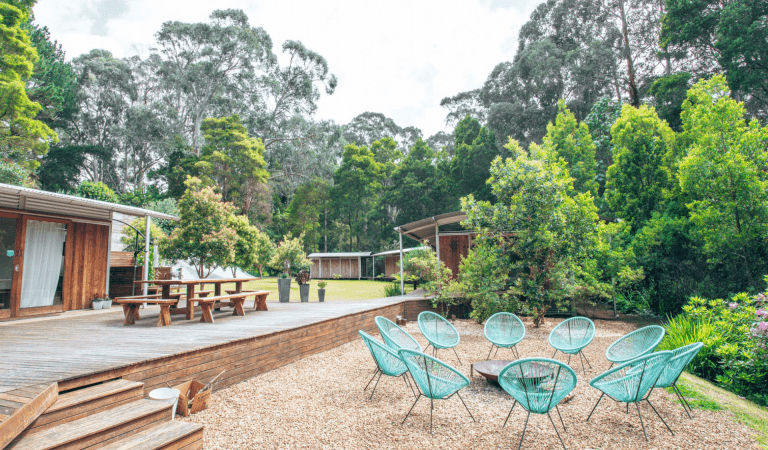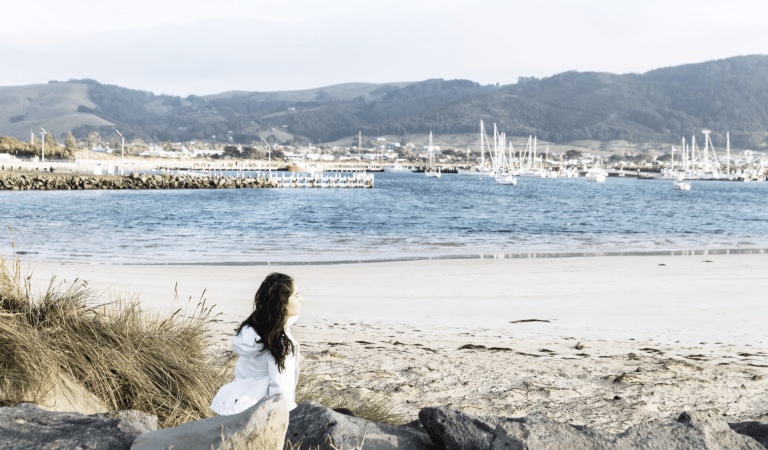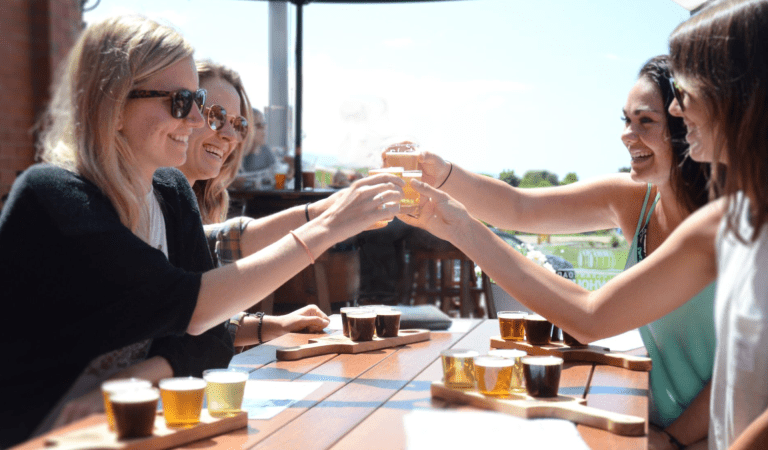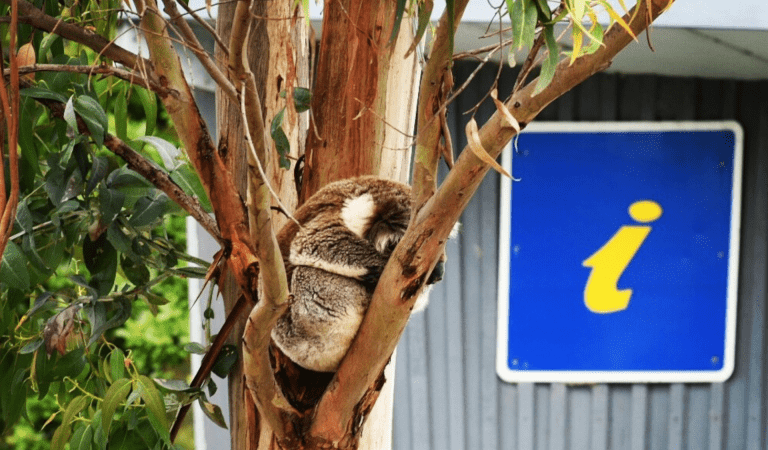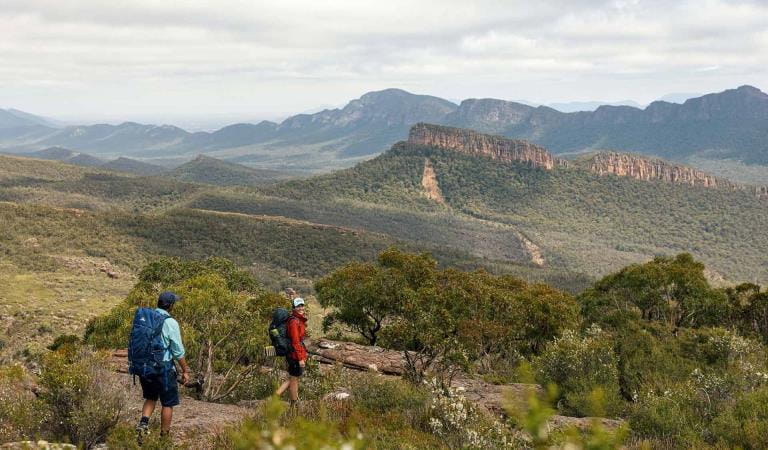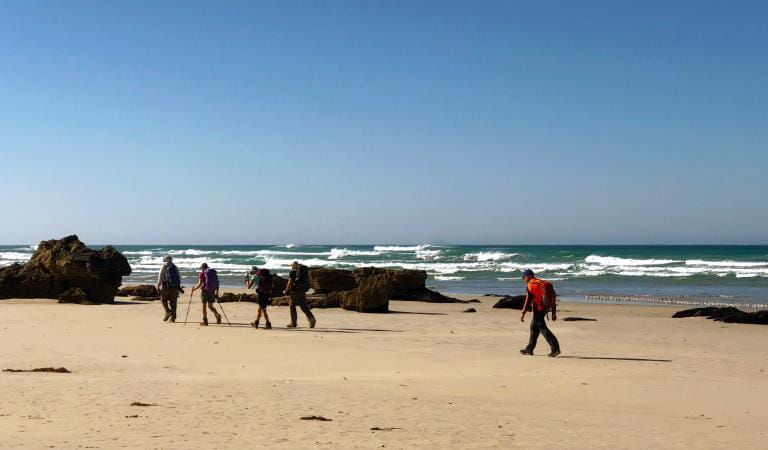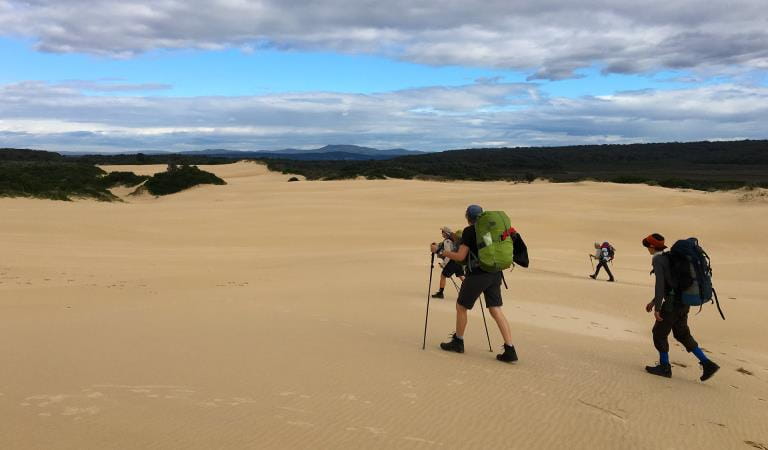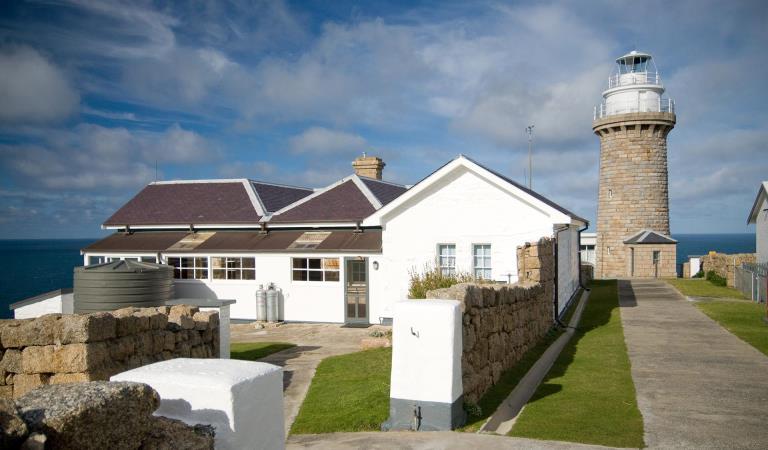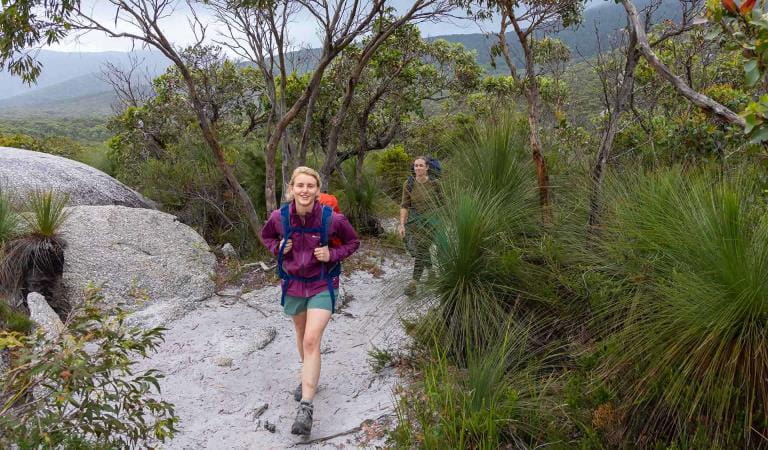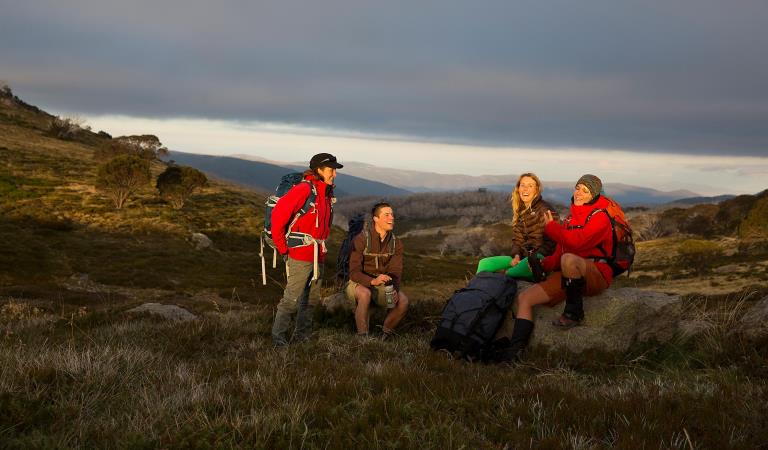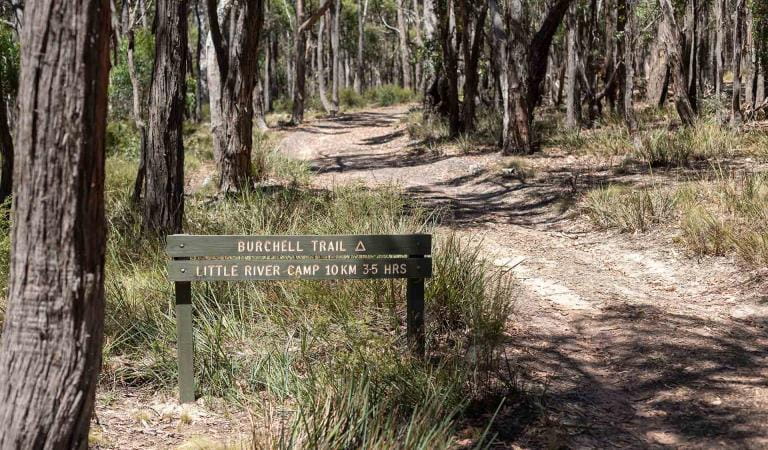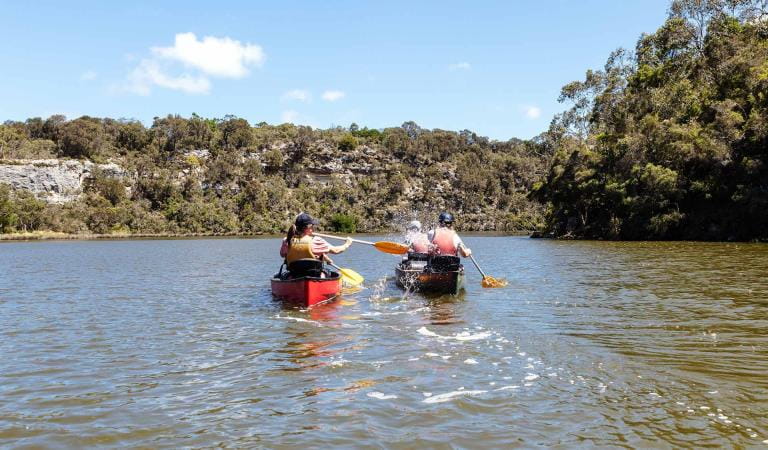The Great Ocean Walk is a one-way, long-distance walk extending just over 110km. This once-in-a-lifetime hike will take you eight days.
Start at Apollo Bay, passing through Great Otway National Park and Port Campbell National Park on the way. You'll conclude your journey at the world-famous Twelve Apostles. Alternatively, you can sample sections on a range of short, day, and multi-day hikes.
The Great Ocean Walk shadows the iconic Great Ocean Road. Every day is different as those stunning coastal landscapes you see from your car window pass beneath your feet. The big skies and wild nature will astound you.
Discover the region’s diversity of plants, animals and scenery. Weave your way through tall forests, coastal heathlands and beside rocky shore platforms. Cross creeks and rivers and pass above wild-rocky shores and deserted beaches with panoramic views from windswept cliff-tops.
Walkers can stay at one of the dedicated campsites or find off-walk accommodation nearby with the comfort of hot showers and soft beds. There are seven small hike-in campsites, which must be booked prior to walking. Campgrounds are small and walking groups need to consider their noise and environmental impacts.
What might you see along the way:
- Koalas resting in the eucalypt trees.
- Cape Otway Lighthouse and its friendly guides ready to share stories of the Shipwreck Coast.
- Wreck Beach at low tide with its rusting shipwreck anchors from the Marie Gabrielle and Fiji.
- Rockpools at Blanket Bay and the pounding surf of Johanna Beach.
- Wet fern and rainforest gullies sheltered by the world’s tallest flowering plant.
- Remote and rarely visited places such as Station Beach, Milanesia Beach, Ryans Den, and Devils Kitchen.
- Winter migrations of Humpback and Southern Right Whales passing just off-shore.
- The high coastal cliffs of Moonlight Head.
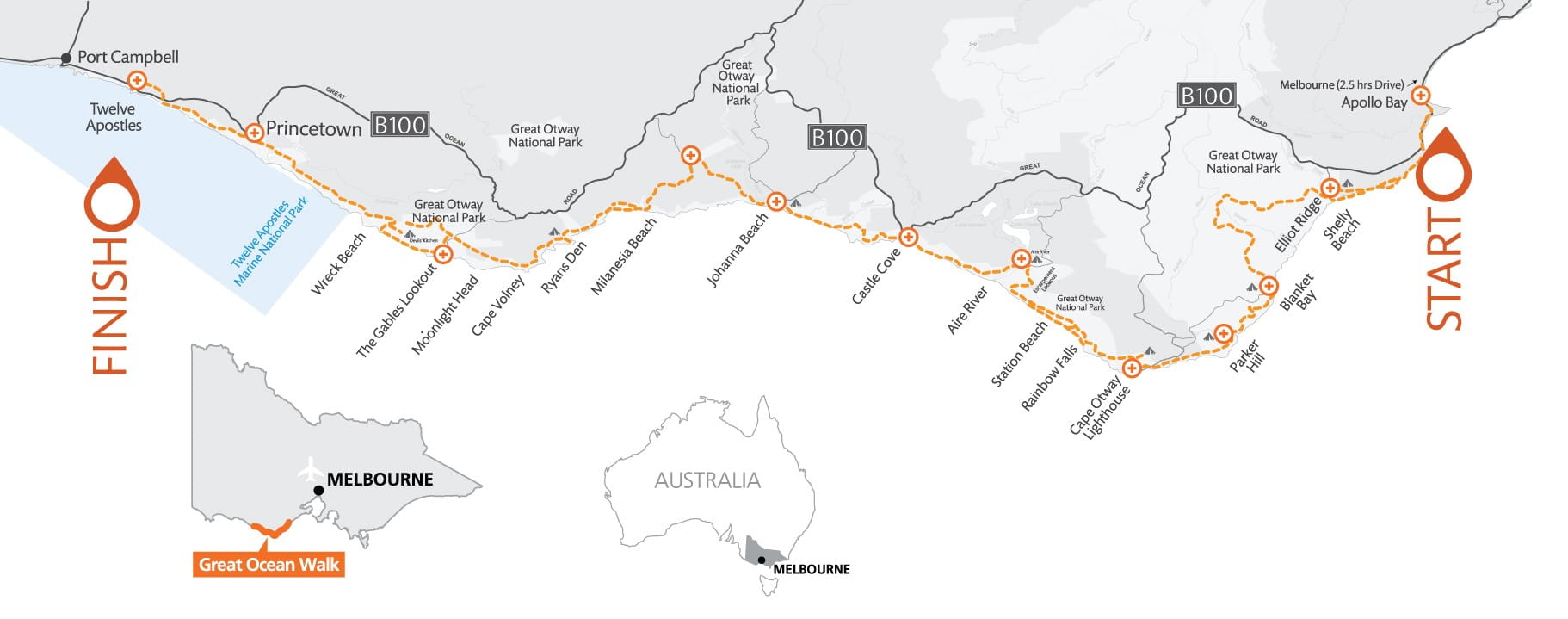
Walk Experiences
The Great Ocean Walk offers a range of options for walkers with varying skill levels. Tackle the whole eight days, or experience it in shorter snippets. Choose from a variety of short, day and overnight hikes. You can experience the walk independently, use a licensed tour operator, or mix and match.
Licensed tour operators
Short and Day Walks
Hike for 1–3 nights
Hike for 4–6 nights
Hike the whole 8 days
Wildlife
Look and listen carefully and you will be rewarded. The Great Ocean Walk offers many opportunities to view wildlife in its natural settings – on land and out to sea.
How to get there
Great Ocean Walk
Apollo Bay — the start of the Great Ocean Walk — is three hours' drive from Melbourne along the Great Ocean Road. If you have one vehicle we recommend that you park at the Twelve Apostles Carpark and get shuttled back to Apollo Bay to start your walk. If you don't have a vehicle, you can go with a Licensed Tour Operator or use one of the shuttle services.
We suggest the following shuttles:
- Walk 91: (03) 5237 1189
- Ride With Us: 0438 407 777
Alternatively, use public transport. The V/Line bus stops at the Twelve Apostles Carpark, Princetown and Apollo Bay.
When you're there
The official Information Guide and Map to the Great Ocean Walk can be purchased from the Great Ocean Road Apollo Bay Visitor Information Centre in person or over the phone on 1300 689 297.
Plan and Prepare
Walkers must move in an east-west direction. The walk was designed and built to be walked in an east-west direction. This will maximise views and generally provides the best gradient to reduce impacts from walkers and congestion of the walk and its facilities.
If you have not undertaken a long-distance walk before, or for a reasonable period of time, it is recommended you undertake some walk training. You will be walking all day, for up to 8 days. There are steep staircases and track sections that go up and down again. Sections of the track can be wet, muddy and slippery. Prepare well to enjoy yourself and get the most from your experience.
It is recommended that any operator, group or individual wishing to walk the Great Ocean Walk must register their itinerary at least 14 days in advance. It is particularly important for non-booked long distance hiking as recommended by Trail Hiking Australia.
Explore the region
Off-walk accommodation
Towns and Villages
Eat and Drink
Visitor Information Centres
Need to know
Great Ocean Walk
Accessibility
There are some sections of the Great Ocean Walk that are accessible for visitors with mobility limitations and for families with strollers. These sections vary in level of difficulty and are dependent on the type of mobility equipment used. Visitors to the Great Ocean Walk are required to travel in an east to west direction.
Many sections of the Great Ocean Walk are unsuitable for wheelchairs and strollers due to steepness and the presence of many steps. Some sections of the walk are also unsuitable due to very loose beach sand, river crossings and intertidal zones.
The most accessible sections of the Great Ocean Walk are:
- Apollo Bay Visitor Information Centre to Marengo Caravan Park
- Cape Otway Lighthouse car Park to Aire River Camp Ground
- Gibson Steps to Twelve Apostles Visitor Centre.
Beach Walking and High Tides
Planning ahead using tide times may save yourself a lot of inconvenience, disappointment and delay during your walk. Many beaches are exposed to high tides, large waves and hidden dangers like ocean currents, rips and reefs.
In some sections of the Great Ocean Walk, alternate beach walking sections are available. Beach access points are marked on the Great Ocean Walk Map and on the walk. Emergency markers state your ‘on and off’ access points and yellow flags mark track arrival and departure points from the beach.
The Great Ocean Walk in-land routes offer shelter from strong sun, bad weather, high tides and waves. It is vital that you consider tides, ocean swell and weather before taking an alternate route. Conditions may change quickly. You should only attempt to walk along the coastline during low tide and calm sea conditions.
The Great Ocean Walk route is clearly marked with signs and has inland options in all areas except Storm Point, West of Bald Hill, Johanna Beach and Milanesia Beach first section. Beach walking is required in the Milanesia (300m) and Johanna (2km) sections of the walk. These beaches and generally passable under normal tide and calm weather conditions. Only proceed with these sections when it is safe to do so.
Wreck Beach (at Moonlight Head) should only be walked at low tide. Walking under the cliff line can become dangerous or impassable at high tide or with large ocean swell. Ensure you are aware of Port Campbell tide times prior to attempting this section of the walk.
Refer to Port Campbell tide times (subtract 4 minutes from Portland tide times) for west of Moonlight Head to the Twelve Apostles, including Wreck Beach.
Refer to Apollo Bay tide times (subtract 28 minutes from Port Phillip Heads times) for east of Moonlight Head.
River crossings
No pedestrian bridge exists for Elliot, Parker Inlet, Johanna and Milanesia River crossings. Heavy rain, rough seas and high tides may make crossings at Elliot, Parker, Johanna and Milanesia Rivers challenging or impossible. Hikers may need to wade across rivers after high rainfall.
It is your responsibility to carefully assess depth and flow before you cross. Be prepared to wait until you consider it safe to cross.
Frequently Asked Questions
-
Can I have a campfire?
Campfires are NOT permitted within Great Ocean Walk hike-in campsites at any time.
The nearby car-based Blanket Bay Campground and Aire River West Campground permit campfires. Campfires are only permitted in the designated fireplaces and campers must bring their own firewood from outside the national park.
It is prohibited to light a campfire on a declared Total Fire Ban day in the South West Weather District, inside or outside tents, shelters or toilets. A portable gas stove is permitted to use for the sole purpose of meal preparation, providing it is in a stable position, in a 3m area cleared of flammable material. You have at least 10L of water immediately available and an adult must be present.
-
What if I cannot complete the walk?
To assist park staff to locate and contact people on the walk when emergencies occur and to ensure hiker safety, it is important that you inform Parks Victoria if you do not complete any section of your registered hike.
For your safety, and your role and responsibility in supporting efficient search and rescue, we recommend you register your trip intentions to aid emergency support should the need arise.
A Trip Intention Form is advised for any hikers undertaking walking/hiking overnight.
-
Where can I park my car?
No designated long-term parking exists for the Great Ocean Walk. It is strongly recommended that hikers use the shuttle services available.
There are unsecured public car parks on the foreshore between Apollo Bay and Marengo. No designated long-term parking exists in this area. Unsecured public parking exists in the Great Otway National Park at day-visitor car parks and camping areas.
Parking may be available at Princetown Recreation Reserve for hikers completing the 'end' of the walk. You should confirm with the Princetown Recreation Reserve caretaker (call 0457 198 662) BEFORE parking there. This is relatively secure parking and walkers can drop their packs off at their cars here before continuing the final 5km to end at the Twelve Apostles.
Great Otway and Port Campbell National Park carparks are open to the public at all times. Please note:
- The Twelve Apostles carpark is not patrolled after hours.
- Hikers leave their vehicles in these areas at their own risk.
- Please remember to remove valuables and lock your vehicle.
- It is NOT recommended that visitors use Gibson Steps carpark for overnight parking. (very small, no facilities)
Your car safety remains your responsibility. Be sure to advise police if you intend to leave a vehicle for any length of time beyond one day.
-
Is there drinking water available along the walk?
There are rainwater tanks at the Great Ocean Walk hike-in campgrounds, which collect untreated rainfall water. Due to the remote nature of the campsites, Parks Victoria cannot guarantee rainwater availability at each campsite.
It is anticipated that Great Ocean Walk campsite rain water tank levels are currently at adequate levels for use by hikers. If they drop below serviceable volumes, our Ranger team will provide advice in the change of conditions section of this page.
Hikers are responsible for their own water requirements. Tank-rainwater, when present, can be treated in several ways such as filtering and boiling or adding sterilisation tablets. Hikers should carry extra water in warm weather.
There are a number of licensed tour operators who provide options to have water dropped off or delivered ahead of your hike.
-
Can I purchase food along the way?
It is recommended you carry enough food for the walk as options for purchasing food are very limited. You may be able to purchase food from the following locations:
- The historic Cape Otway Lightstation precinct café serves light meals and refreshments during business hours. Entry fees apply.
- The Lightstation entry station sells cold drinks and snacks to visitors choosing not to enter the historic area.
- Apollo Bay has supermarkets for comprehensive shopping needs and nearby villages are located at Lavers Hill and Princetown and Bimbi Park on Cape Otway.
Parks Victoria’s licensed tour operators can provide a food and water drop-off service
-
What should I bring?
Whether you are planning a multi-day hike or an afternoon walk, it is important to plan in advance. Coastal weather can change quickly and be unpredictable in all seasons. Be prepared for strong winds, heavy rain; as well as hot or cold weather throughout the year.
- Protective clothing such as a jumper, weatherproof jacket, hat and sunscreen.
- Sturdy footwear with a good tread.
- First Aid Kit — for blisters, sunburn, stings and bites (especially if you have extreme reactions/allergies).
- A large waterproof bag – may be useful for keeping gear dry inside your pack when crossing rivers.
- A portable radio (not mobile phone/internet access) for immediate access to Emergency broadcasting and updates (e.g. fire and storm warnings and updates) including ABC Local Radio.
- Food and Water — Carry food, water, water treatment methods, and equipment for up to 15km per day if you are walking unsupported. Alternatively, you may consider linking your walk to nearby accommodation and service providers. Water is untreated rainwater and not guaranteed to be available at campgrounds.
- Leave no trace — please ensure that you carry all your rubbish out with you. Do not deposit rubbish into the composting toilets as this stops the systems from working and staff then have to physically remove your rubbish by hand.
-
Is there mobile phone and internet coverage on the walk?
Mobile coverage is intermittent along the Great Ocean Walk. Generally, Telstra mobile coverage can be found at high points where there is little overhanging vegetation.
Known mobile phone reception areas (Telstra only) include; Blanket Bay beach area, above Station Beach, Johanna Beach, Milanesia Beach at creek crossing, Ryans Den campground, Moonlight Head and Devils Kitchen campground ocean-view areas.
-
Can I swim along the Great Ocean Walk?Beaches along the track not patrolled by lifesavers, therefore swimming is not recommended. For information on patrolled swimming beaches, contact the Apollo Bay or Port Campbell Visitor Information Centres.
-
Where can I book a tour to complete the walk?
One of the best ways to experience the Great Ocean Walk is with a Licensed Tour Operator. Booking a Licensed Tour Operator gives you the confidence they are insured and comply with park regulations and best of all, they do all the hard work for you by planning and preparing your visit so you can enjoy your nature-based adventure to the fullest.
Change of Conditions
Nature being nature, sometimes conditions can change at short notice. It’s a good idea to check this page ahead of your visit for any updates.
-
Loch Ard Gorge (Port Campbell National Park)
Loch Ard Gorge Beach Access Steps Closed
Loch Ard Gorge beach access steps are currently closed due to geological instability. The site will remain closed until remediation works are completed to remove the hazards and ensure visitor safety.
-
Notices Affecting Multiple Sites
Great Otway National park sites closed due to major flood damage
Severe thunderstorms and flash flooding on 16 January 2026 has caused significant damage across parts of the eastern Great Otway National Park.For public safety, the following areas are closed until further notice while assessments and clean-up works are undertaken:Closures included but are not limited to :Erskine falls is limited to the top viewing platform. Access to the base of the falls and along the river track is closed.Roads & TracksWye RdWye TrackCurtis TrackGodfrey TrackJamieson Track
Walking tracks
St George
Phantom falls
Lemonade ck
Kalimna
Henderson
Sheoak FallsSheoak picnic ground walking Nature LoopCumberland
Cumberland Garvey Link
Kalimna Garvey LinkCora LynnErskine Falls Walking TrackWon WondahMany roads, tracks and visitor facilities are impacted by debris, flooding and unstable conditions.The Great Ocean Road has been impacted,Always follow safety signage and directions from response crews, and do not enter any closed areas.Thank you for your patience and understanding as works are undertaken to make these popular areas safe to visit again.
Great Ocean Walk destination car parking at the Twelve Apostles visitor center during summer & Peak Visitation periods
During the busy peak visitation period at the Twelve Apostles precinct (from summer through to early autumn including school holidays, public holidays, long weekends & busy peak visitation weekends concluding after Chinese New Year / Easter), due to the sheer volume of visitors onsite, a traffic management program is in place to maximize public safety & ensure visitor experience. If you are planning to park your vehicle at the Twelve Apostles before walking the Great Ocean Walk (or sections of it including section 8) during this period, please communicate this information to onsite traffic control staff at the entrance & they will do their best to accommodate your vehicle in the main carpark. This will avoid your car remaining in the overflow carpark area which needs to be cleared and locked each night. Similarly, if you arrive at the Twelve Apostles to park your car at a time when traffic control are not onsite, or setting up, please park your vehicle in the main carpark area. Your assistance is greatly appreciated!


